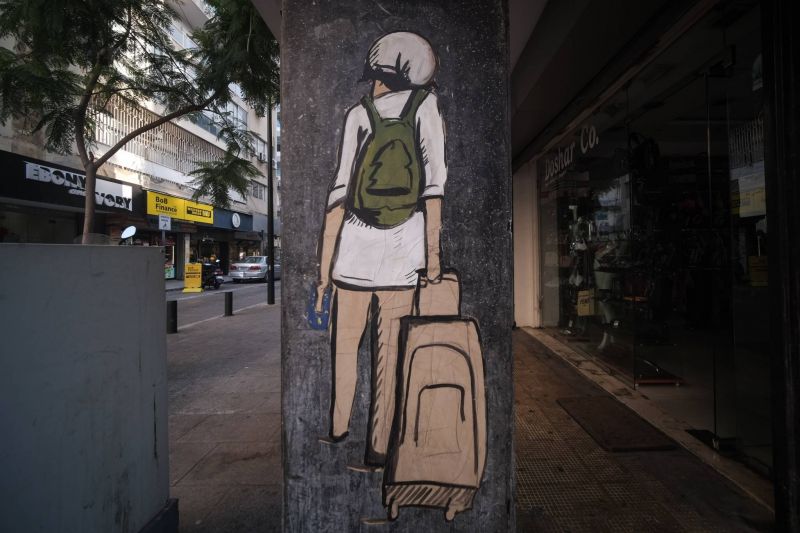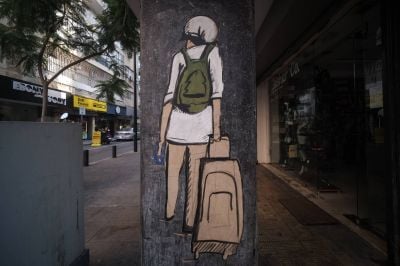
Street art in Beirut. (Credit: João Sousa/L'Orient Today/File photo)
Despite Lebanon’s economic collapse since 2019, tourism skyrocketed this year. In June, tourism professionals said some two million visitors are expected this summer, the highest figures since 2019, despite several overlapping crises and COVID-19.
As is the case every year, the expatriates returning for the summer holiday have a strong presence in the country. Last year, out of a total of nearly 2.5 million arrivals in Lebanon, including 1.3 million between early July and late September 2022, nearly 62.6 percent were Lebanese expatriates, according to the latest figures provided by the Tourism Ministry and General Security.
While the summer season is already proving to be remarkable, it is also outstanding for some Lebanese expatriates, who have not returned to the country since the start of the crisis. Though they’re excited to reunite with family and friends, they say they are also racked with questions and concerns.
L’Orient-Le Jour spoke to four of them.
The wealth gap and lira value
Andre Chidiac, 66, head of surgery at a hospital in Toulon, France, fled the Civil War in 1977. Since then, he continued to return to Lebanon once or twice a year, until 2019. The crisis and the outbreak of COVID-19 put the brakes on his return to his family, which he finally scheduled for September 2023.
“My sister is still there, I’m going back mainly to see her,” he said, adding that he doesn’t know what to expect, as he continues to keep abreast of developments in the country via local TV channels and what his family tells him.
“On the one hand, everyone is telling me that everything is fine, but at the same time, I’m prepared to see a lot of poverty and a population that’s a bit desperate. I have the impression that the middle class has disappeared, that the only people left are either the rich or the poor,” he said.
Chidiac was planning to spend six months a year in Lebanon when he retires, but the current situation has him rethinking. “I’m worried about the future of the country; we can see it gradually dying out. The politicians are doing nothing. They are defending their own interests rather than those of Lebanon. I don’t know how to survive in this country without electricity and running water.”
“When I get there, I’ll see how things are.”
The lira instability also worries him: “I’m going to have to take a small suitcase to carry all the lira or walk around with dollars!” The last time Chidiac came to Lebanon, the dollar exchange rate was still atLL1,500. Today, the greenback hovers at about LL92,000. The largest Lebanese banknote, which is the LL100,000, was worth $66.67 before the crisis. Now it’s just about $1.
While the lira-to-dollar exchange rate has been stable in recent months, society has become increasingly dollarized. As a result, the cost of living has risen sharply, and those returning to Lebanon after four years find the change someone astonishing.
“I had planned a budget similar to that of a fairly expensive city in Europe. I even spent more than that, I didn’t even go to luxury places. It’s crazy to see that,” said Marc Elie Hayek, a 27-year-old chef. Hayek, who moved to France in 2014, was returning home regularly until 2019.
The young man described part of his return as “traumatic.”
“We’ve always lived in bubbles, with social differences, but this time I felt that like never before. My family is still based in Lebanon and I get the news on a daily basis, but one does not understand the reality until they get here. You feel like you don’t know your own country anymore.”
Hayek insists that he will “never stay in France for another four years without coming back.”
Souad Elden, a 28-year-old speech therapist, traveled much of the world before returning to her country, which she hasn’t seen since the summer of 2019. Straight from Sydney, she made the same observation:
“I didn’t think the lira devaluation was so serious. I came with dollars and we quickly ran out of them, and it was complicated to withdraw money with our international bank card.”
The Lebanese-Australian was surprised by the differences in the standard of living of the Lebanese: “The gap between the rich and the poor has become so wide that it’s difficult to fully appreciate your trip.”
Caren Abbas, 35, left Lebanon in July 2020 to settle in Montreal and returned for the first time this June. A mother of two, she couldn’t see herself returning before then, because of the successive crises: fuel and medicines shortages, cholera, no electricity, among others. During her stay, it was once again the disparities in wealth and the lira rate that had a major impact on her: “When I came back, I didn’t understand anything anymore.”
Abbas was nevertheless surprised to see the bars and restaurants full, in total contradiction with what she had seen on the news. “It was a shock. When you see the news, it’s very pessimistic.”
It was a situation that she couldn’t accept until she started talking to local people: “In Lebanon, there’s no real future. They earn money at work and spend it because they no longer deposit anything in the bank. It’s as if there’s no tomorrow because there’s no state.”
This article was originally published in French in L'Orient-Le Jour. Translation by Joelle El Khoury.
